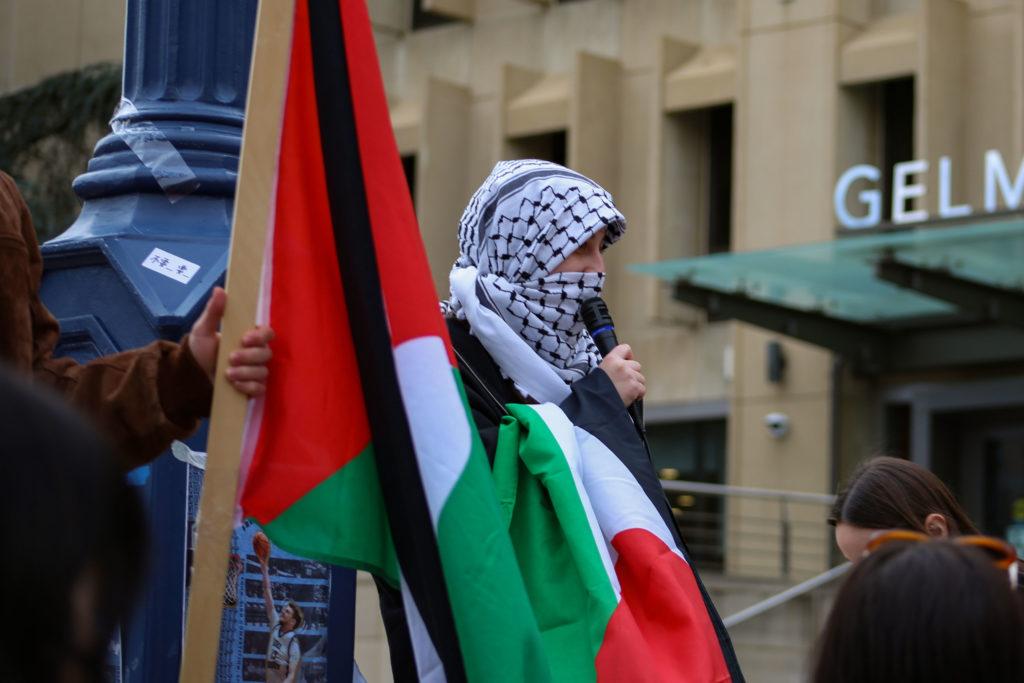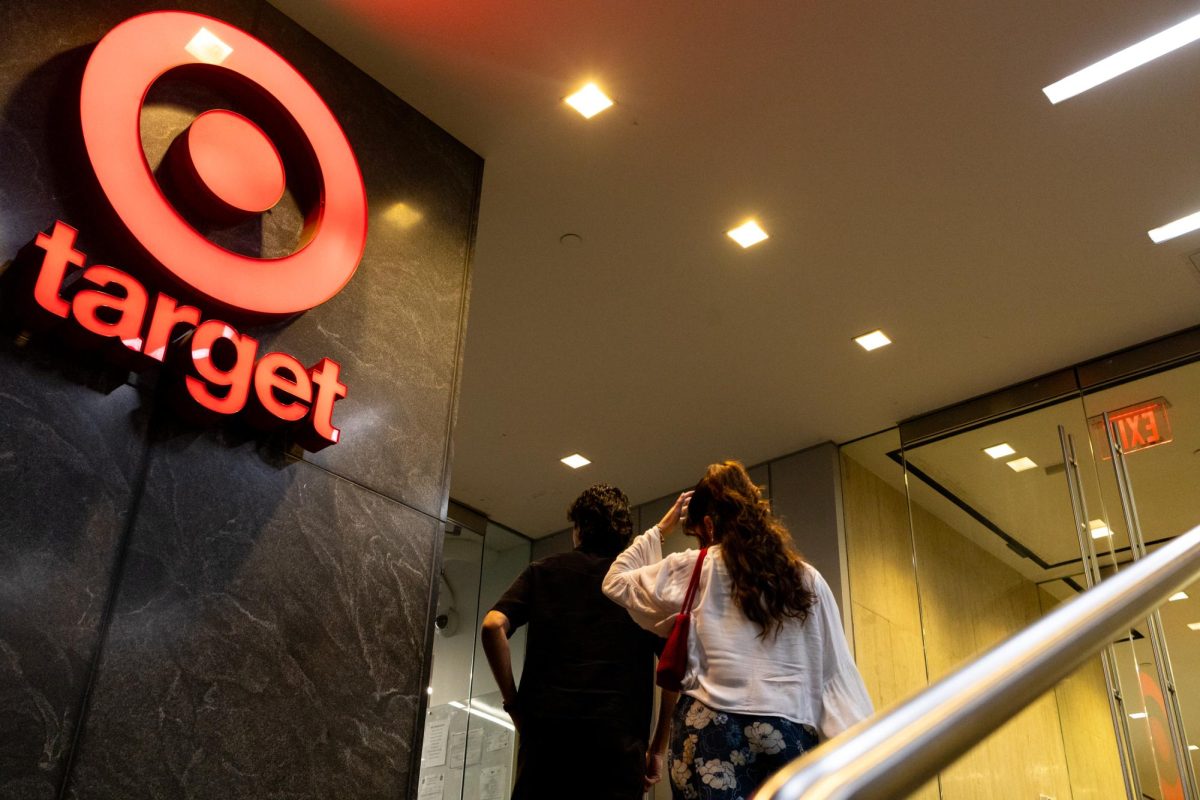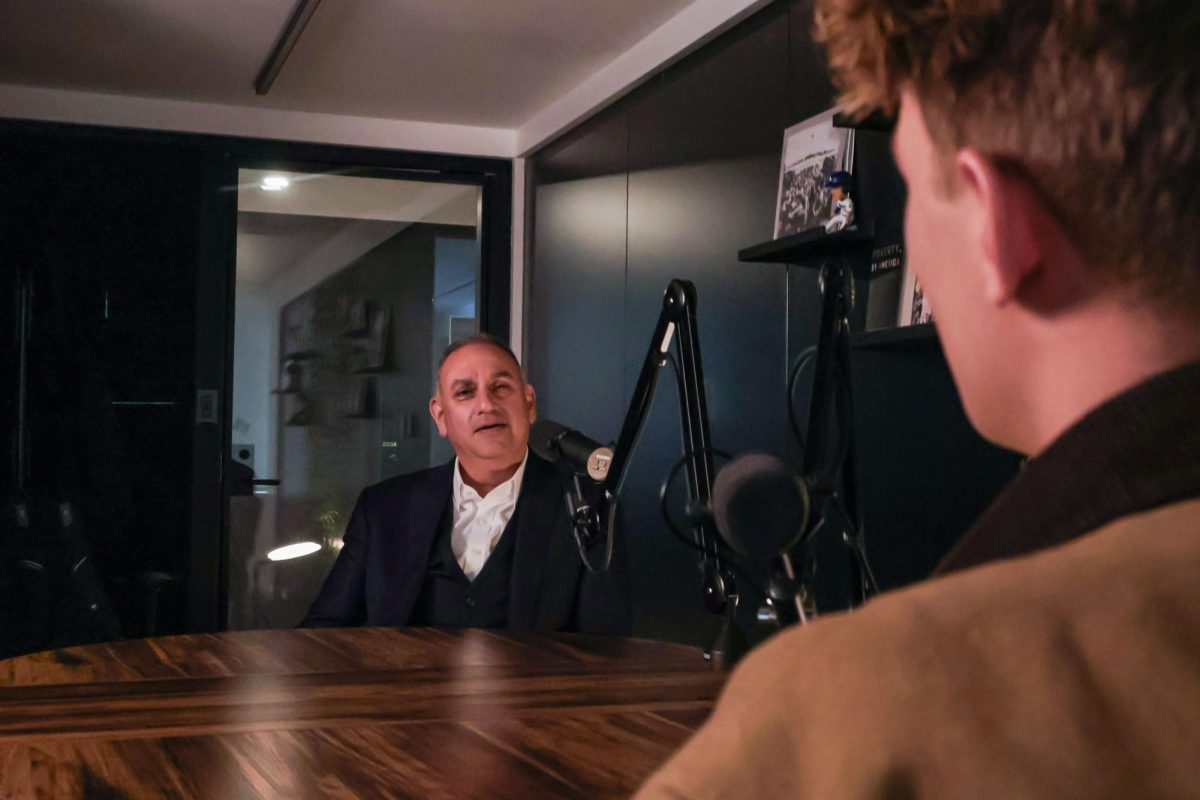Students protested a University hearing on misconduct allegations against Students for Justice in Palestine and its president Friday for damaging benches outside the GW Hillel building as part of a postering campaign in support of Palestinian rights in early October.
About 40 students gathered in Kogan Plaza for the protest across from the University Student Center, where the Office of Student Rights and Responsibilities organized the hearing to decide on potential disciplinary probation sanctions against the student organization and its President Lance Lokas. SRR charged Lokas and SJP with disciplinary misconduct for the damage caused by wheatpasting, a process of hanging posters with a mixture of starch and water, on the benches outside of the GW Hillel building.
SJP led a postering campaign in October with signs reading “Zionists F*** Off” and “Decolonize Palestine” leading up to a speaker event that GW for Israel and GW Mishelanu hosted with Doron Tenne, a former Israel Defense Forces intelligence officer, at the GW Hillel building. Student leaders with SJP, Jewish Voice for Peace and other student organizations gathered in Kogan, where they denounced the student conduct proceedings and yelled chants like “GW shame on you” and “from GW to Palestine, occupation is a crime.”
In a speech after the hearing, Lokas told the crowd of protesters that he denounced alleged racism and anti-Palestinian discrimination within GW’s administration in a statement at the hearing. Lokas said Kirstein testified during the hearing and accused SJP of spreading antisemitism and violating the safety of students who view GW Hillel as a home.
“An organization that claims to be a home does not invite a war criminal on campus to speak to students,” Lokas said. “An organization that claims to be a home does not sanction the genocide of indigenous Palestinian people.”
Lokas said he expects SRR to release a decision on the case next week.
In a statement Wednesday, University spokesperson Julia Metjian said when the University receives reports of student activity that may violate GW policy, officials respond in accordance with the Code of Student Conduct and applicable University policies and procedures. She declined to comment on the disciplinary proceedings of the case.
“The University continues to support the right of all members of the University community to engage in debate and discussion, as well as protest, in accordance with University policies,” Metjian said in an email.
Adena Kirstein, the executive director of GW Hillel, said in an email to the GW Hillel community Friday that the posters caused between $1,200 and $4,500 in damage to benches outside of the building. The protesters’ lawyer is disputing these claims, alleging the wheatpasting poster technique did not cause any damage.
In a statement Kirstein said she read during the hearings alleged that Lokas used a “heavy-duty paste” that left damage on the cement benches outside the Hillel building requiring them to be polished, with price estimates ranging in the thousands of dollars. It’s unclear whether Lokas and SJP face charges for damages to any other physical property on campus.
The statement admonished Lokas for the “vandalism” of Hillel benches after the posters were “very difficult” to remove. Kirstein said the protest against Tenne did not serve as the basis of the hearing, just the alleged property damage from the posters.
“I have a deep appreciation for free speech and understand that all have a right to express their opinions, even if I disagree with them,” she said in the statement, which was obtained by The Hatchet. “But what crossed a line for me was the placement of these signs on Hillel property.”
Students postering must “only” use masking or painters tape, push pins or staples while hanging up posters on University property, according to the Student Organization Handbook. The handbook also states postering on benches, sidewalks and trash cans is prohibited.
“Content may not include discriminatory language or any content that promotes actions contrary to GW policy,” the handbook reads.
Kirstein said the group “attacked” Jewish students at GW with the posters on Hillel’s property, making them feel unsafe.
“Your actions didn’t make any Palestinian lives better,” she said. “But your actions did hurt Jewish students at GW, who felt targeted and attacked.”
Danielle Katz, a member of Jewish Voice for Peace GW, said JVP participated in wheatpasting around campus as part of the postering campaign and other political events with SJP, but their organization received “little to no” disciplinary investigation. She said students have seen “time and time again” that the University has taken continuous action to “silence” Palestinian students and activists on campus.
“GW is explicitly complicit in the discrimination and censorship of Palestinians on this campus,” she said at the protest.
Palestine Legal, the Palestinian rights advocacy organization representing SJP, filed a civil rights complaint with the DC Office of Human Rights against the University in November 2021 alleging that the University had been “selective” in its trauma support offerings. OHR has declined multiple requests for comment about the complaint.
Katz said Friday’s hearings signaled the University has continued to side with Zionists on campus. She said the protest served to stand in solidarity with SJP and demand GW to drop the charges.
“Today we are here to stand with GW Palestinian students to say we have our eyes on GW, we will hold admin accountable and we will protect Palestinian students,” she said.
JVP released a joint statement with 27 other organizations on Instagram Friday supporting SJP and Lokas in light of the “racist disciplinary charges.” The Palestinian Youth Movement and student organizations like the GWU Muslim Student Association and the GW South Asian Society signed the statement alongside organizations from other local universities, including the SJP chapters at George Mason and American universities and the University of Maryland.
“The disciplinary charges that are being brought against SJP as an organization are false and based solely on a hatred of SJP’s just political message, showing overt discrimination on the part of the administration,” they said in the statement.
Dylan Saba, a staff attorney for Palestine Legal who is supporting SJP and Lokas, said the posters did not leave damage on Hillel property or anywhere else on campus.
“He, as an individual and the organization, followed all school rules and were acting in compliance with municipal law in the same way that other student organizations do wheatpasting and postering,” Saba said.
Saba said if the University finds SJP guilty for misconduct, there is a “high likelihood” that the student movement would submit an appeal.
“They didn’t damage any property, they didn’t violate any school rules or any city laws,” he said. “And it would be pretty troubling if they were found guilty, and it would be evidence of some pretty bad retaliation from Hillel.”
If found guilty of misconduct, the organization and Lokas could face censure or disciplinary probation, Saba said. He added that the organization could face limitations of privileges, which reduces access to participation in University events, use of GW resources or the privilege for individuals to hold leadership positions in student organizations.








